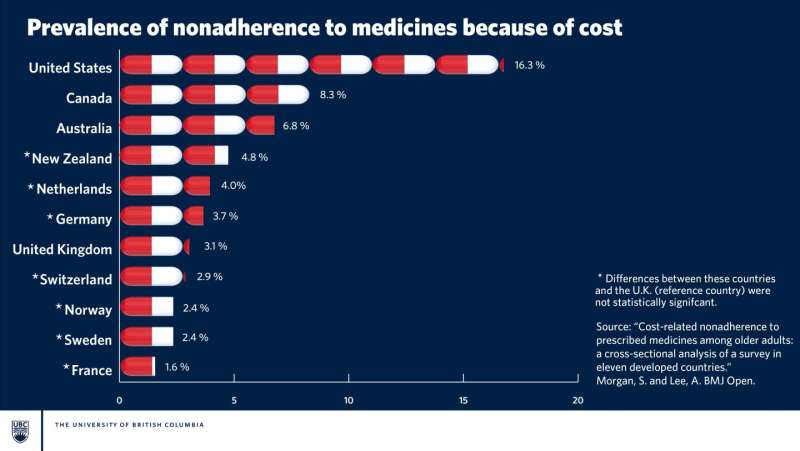Older Canadians skip meds due to cost, putting them at risk for complications

One in 12 Canadians aged 55 and older skipped prescriptions due to cost in 2014, the second-highest rate among comparable countries, new UBC research has found.
"When patients stop filling their prescriptions, their conditions get worse and they often end up in hospital requiring more care which in the long run costs us more money," said Steve Morgan, senior author of the study and professor in UBC's school of population and public health.
The research draws on the 2014 Commonwealth Fund International Health Policy Survey of Older Adults (persons aged 55 years or older) in 11 high-income countries: Australia, Canada, France, Germany, the Netherlands, New Zealand, Norway, Sweden, Switzerland, the United Kingdom, and the United States. Among countries with publicly-funded health-care systems, Canada is the only one without coverage for prescription medications.
In an analysis of survey responses from all 11 countries, the researchers found that Canada had the second-highest prevalence of skipped prescriptions due to cost, at 8.3 per cent. Access was worse only in the United States, where 16.8 per cent of respondents reported such financial barriers to filling prescriptions. In contrast, fewer than four per cent of the populations in most other comparable countries reported skipping prescriptions due to cost.
In a separate analysis of the Canadian survey responses, researchers found that Canadians aged 55 to 64 face the greatest barriers to filling their prescriptions. One in eight Canadians aged 55 to 64 reported that they did not fill prescriptions because of cost in 2014, in comparison to one in 20 Canadians aged 65 and older—who, by way of age, qualify for comprehensive public drug coverage in many provinces.
Morgan points to gaps in drug coverage available to Canadians as a problem. Unlike other countries with universal public health care, public drug plans in Canada generally only cover select groups, such as social assistance recipients and people over age 65. Other Canadians may receive drug coverage from private insurance through their workplaces or none at all.
The survey found that Canadians who did not have insurance were twice as likely to report not filling prescriptions because of cost. It also showed that low-income Canadians were three times more likely to report financial barriers to filling prescription medicines than high-income respondents.
Morgan said the 2014 findings were consistent with studies that date back a decade, indicating affordability of prescription drugs is still a public health issue in Canada.
"Our problem hasn't gone away. Financial barriers to prescription drugs are still high, both in absolute terms and relative to our peer countries."
The research was described in two studies published in BMJ Open: http://bmjopen.bmj.com/content/7/1/e014287 and CMAJ Open: http://cmajopen.ca/content/5/1/E40.full
More information: Steven G Morgan et al, Cost-related non-adherence to prescribed medicines among older adults: a cross-sectional analysis of a survey in 11 developed countries, BMJ Open (2017). DOI: 10.1136/bmjopen-2016-014287
Augustine Lee et al. Cost-related nonadherence to prescribed medicines among older Canadians in 2014: a cross-sectional analysis of a telephone survey, CMAJ Open (2017). DOI: 10.9778/cmajo.20160126
















